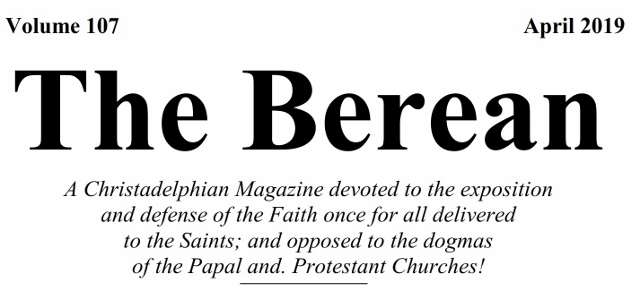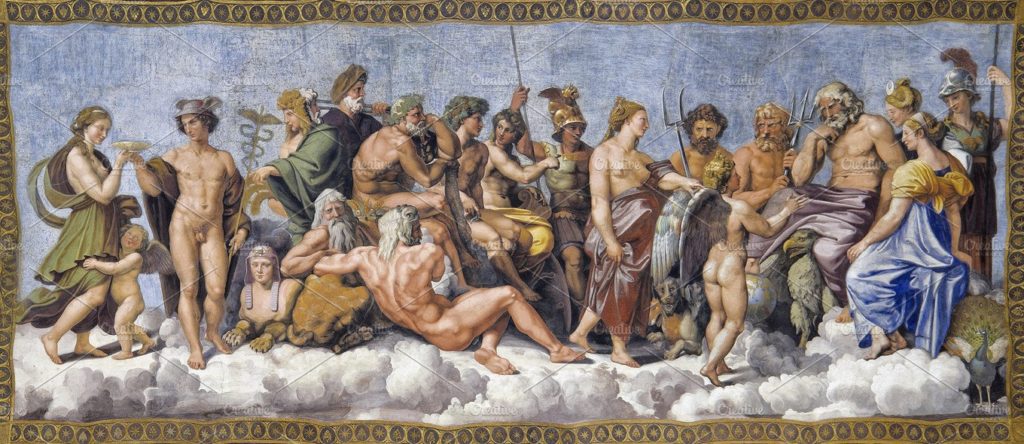I was sent a recent copy (April 2019) of The Berean, a Christadelphian magazine, and asked to comment on it. The editor, who is based in Texas, informs me it is not an official publication but a private initiative made available to any and all who choose to subscribe. Nevertheless, it gives a helpful insight into the Christadelphian world view, echoing much of the character and outlook of all fundamentalist, Adventist groups. You can read an introduction to the Christadelphians here.

Right is part of the masthead of the magazine. It is immediately clear that it is as much about what Christadelphians are against, as what they are for. This is typical, of course, of the thinking in these groups. It is well said that a cult draws a circle around itself and everyone inside the circle is right, everyone outside wrong. For Christadelphians that is just about everyone, Catholic and Protestant. There are today approximately 50,000 Christadelphians across 120 countries – an elite group indeed.
The editorial begins, ‘Christadelphians deny…’ and that seems to set the tone for the magazine. What the editor denies is the doctrine of the Trinity, quoting from the Catholic Vatican News, which is attributed to a June 2018 edition, though it is the 24 May 2018 edition:

“Today’s feast invites us to live in the awareness of the presence of the Triune God within us: The Father, the Son and the Holy Spirit. The mystery of the Holy Trinity, a doctrine enunciated by the ecumenical councils of Nicaea and Constantinople, is one of the fundamental doctrines of Christianity and the greatest mystery of our Faith, namely, that there are Three Divine Persons, sharing the same Divine nature in one God. “There is one God, who has three Persons, Father, Son and Holy Spirit. Each Person is God, yet there is still only one God”. We have the Father Who is the Creator, the Son Who is the Redeemer and the Holy Spirit Who is the Sanctifier and the Counselor – One God. The doctrine of Three Persons in one God, co- qual and co-eternal in Divinity yet distinct in Person, is not explicitly spelt out in the Bible. Even the very word “Trinity” is not found in the Bible. But the doctrine of the Trinity underlies all major Christian feasts, including Christmas, the Epiphany, Good Friday, Easter, the Ascension and Pentecost. All the official prayers of the Church, including the Holy Mass and the Sacraments, begin with an address to the Holy Trinity: “In the Name of the Father and of the Son and of the Holy Spirit.”
The editor goes on to misrepresent the Trinity doctrine just described, an important lesson here in paying careful attention to what you presume to refute.
‘This testimony is nothing but confusion. One God with three persons, but each person is a God. Yet, there is only one God. What could be more illogical? And how bold is Christianity to admit that the Bible does not define their doctrine, nor does it even mention their doctrine, yet this doctrine underlies all their traditions?’
Of course, as you will have realised from what I have highlighted, the ‘testimony’ in the Vatican News does not say ‘each person is a God,’ as though to describe three gods. Quoting the ecumenical councils, the statement says, “There is one God, who has three Persons, Father, Son and Holy Spirit. Each Person is God, yet there is still only one God”
Where both Catholics and Protestants see mystery, Christadelphians see confusion. I suppose mystery can look like confusion if the only thing important to you is bringing God and his purposes within the confines of man’s, and fallen man’s at that, limited capacity to understand.
In his excellent systematic theology The Christian Faith, Michael Horton explains that, ‘older theologians of the Reformation and Post-Reformation eras were so convinced that their interpretations fell far short of the majesty of God that they called their summaries and systems ‘our humble theology’ and ‘a theology for pilgrims on the way.” Horton consequently subtitles his work, ‘A Systematic Theology for Pilgrims On the Way.’ It is in such a spirit of humility that theologians allow the Bible to speak for itself and offer their tentative interpretations.
The Trinity doctrine, then, is not three persons, each of whom is a God. rather, it is one God, who has three persons. Even the word ‘person’ here is misleading. To our ears ‘person’ denotes a discreet individual, separate from and independent of another person. We think of three ‘persons’ as three people standing before us. This can lead us to a Tri-theism in which the Trinity functions in much the same way as Peter, James, and John. This is what the Christadelphian seems to have in mind, but this is not the Trinity.
The German word Dreieinigkeit (three-oneness) is a better description of what we are considering. God is one with regard to essence , three with respect to persons. All three persons in the godhead are fully God, no one of them acts independently of the others, a key theme in Jesus’ earthly ministry (John 5:19) It is significant that, in this same passage, Jesus goes on to say that, as the father gives life, so the Son gives life (v.21) as we might expect God to be our final judge, nevertheless, Jesus has been given that role (v.22), and most significantly, all this:
‘…that all may honour the Son, just as they honour the Father. Whoever does not honour the Son does not honour the Father who sent him.’ (v.23-24)
That Bothersome Word Mystery
In their book Reasoning from the Scriptures Jehovah’s Witnesses too criticise early church councils for describing the Godhead as “incomprehensible”. Quoting the words of Jesus in John 4:22 ‘We worship what we know,’ they insist that God is no mystery to the true believer. But however much we know, or think we know, it is well to remember that although
“He has also set eternity in the hearts of men; yet they cannot fathom what God has done from beginning to end” (Eccle.3:11)
‘Fathom’ (NIV) or ‘find out’ (ESV) here translates the Hebrew matsa and has the sense of figuring something out, comprehending by study. God has put eternity in our hearts and so we reach to grasp the eternal, yet our humanity limits our comprehension and we fall back on what the Bible states to be true.
Paul, in his letter to the Romans declared, “Oh, the depth of the riches of the wisdom and knowledge of God! How unsearchable his judgements, and his paths beyond tracing out! Who has known the mind of the Lord? Or who has been his counsellor?” (Romans 11:33-34).
It is always useful to remember that if there are things about God that we cannot understand we are in good company. One writer has helpfully explained that mystery means not the inexplicable but the inexhaustible.
The Revelation of God is an Unfolding Revelation
God’s revelation of himself is an unfolding one. To understand the Trinity we must look at this unfolding revelation. God has revealed himself in the Creation, which plainly speaks of a Creator (Romans 1:19-20)
But God has revealed himself more fully in Jesus, who insists, ‘whoever has seen me has seen the Father.’ (John 14:9) The writer to the Hebrews describes Jesus as, ‘the radiance of the glory of God and the exact imprint of his nature.’ (Hebrews 1: 1-2) Jesus is not ‘like’ the Father, he is ‘the image of the invisible God,’ in whom ‘the whole fullness of deity dwells bodily…’ (Col.2:9) How full is full?
When religious leaders claim further, clearer and fuller revelation, better understanding, they are effectively taking away from God’s revelation in Christ. For a Christian the revelation of God does not hang on an encounter in a grove of trees in up-state New York (Mormons), or an obscure group of Bible students in Allegheny, Pennsylvania (JWs), or the deliberations of a Congregationalist minister’s son (Christadelphians) but in the advent of God’s own Son.
One commentator has said:
“The doctrine of the Trinity is not ‘irrational’; what is irrational is to suppress the biblical evidence for Trinity in favour of unity”
In other words, just because we can’t fully comprehend what Scripture is telling us we should not reject what Scripture is telling us.
- What Christians Believe about the Trinity
Is it 1 God in 3 Gods, or 3 Persons in 1 Person, or 1 Person in 3 Gods? It is important that we both demonstrate and express this truth clearly.
- There is only one God: Deut.6:4; Isaiah 43:10
- The Father is God; 2 Thess.1:2
- The Son is God: John 1:1-5, 14; John 20:28; Heb.1:8-10
- The Holy Spirit is God: John 14: 15-18; Acts 5:3-4; 1 Cor.3:16; 2 Cor.6:16
We believe in 1 God in 3 Persons.
Not because of a heavenly visitation; Not because we worked it out for ourselves; but because the Bible tells us so.
The Infuriated God and the Good God Jesus
This misrepresentation of the Trinity doctrine as Tri-theism leads to further misrepresentation of ‘what Trinitarians believe.’
‘God and Jesus were in heaven, watching Adam and Eve in the Garden of Eden. In seeing them sin, God (the Creator God) became infuriated and determined to destroy Adam and Eve on the spot. Jesus (the Redeemer God) pleaded with God, and said that he would go down to earth, and God could take all his anger out on him, for Adam’s sin, and for all the rest of mankind who would later sin; and then Jesus would die for the sins of all mankind. Such an imagined and unscriptural philosophy makes God a vengeful God, anxious to destroy mankind, rather than the Scriptures definition of Him, as God our Saviour! One who takes no pleasure in the death of the wicked (Ezk.33:11,) but rather has appointed a way for salvation for repentant sinners.’
This is such a distortion of the facts it is difficult to know where to start. It pictures two individuals ‘in heaven,’ the Creator God and the Redeemer God, at odds with each other over sin. The Creator God, in a fit of fury, wants nothing but destruction, while the Redeemer God seeks nothing less than redemption. This is more like the gods of Mount Olympus than anything in the Bible.

Firstly, there are not two gods in heaven but one. Secondly, when the Bible speaks of God’s anger it isn’t uncontrolled fury, such as man would have as suggested here, but God’s settled, considered attitude towards sin. This is why the Westminster Confession describes God as ‘without passions.’
It is not that God doesn’t love, hate, experience jealousy, or express anger, but that he does not do these things as a man might. Thirdly, far from seeking destruction God sought out Adam. It might be said that, in Christ, God is eternally seeking out Adam.
If I were to reword the paragraph to truly represent what Christians believe it might read something like this:
‘The one true God walked in the Garden of Eden with Adam and Eve in perfect fellowship (Gen.3:8) In seeing them sin, God sought after them, calling to the man (Gen.3:9) and became concerned for what had happened to them (Gen.3:11) Finding the root cause of the problem, God was angry and cursed the serpent (Gen.3:14-15). Having promised Adam that disobedience has consequences in terms of spiritual and physical death (Gen.2:17), the perfectly just Creator God passed judgement and banished them from his presence, cutting them off from the tree of life (Gen.3:22). This same one God promised a resolution to this separation in what is called the Protoevangelium. This is the promise that the offspring of the woman would crush the head of the offspring of the serpent (Gen. 3:15)
In Jesus the Redeemer, God fulfilled that promise when the Saviour of the world defeated Satan (Heb.2:14) Paul describes it, ‘…in Christ God was reconciling the world to himself, not counting their trespasses against them…For our sake he made him to be sin who knew no sin, so that in him we might become the righteousness of God.’ (2 Cor.5:17-21) Note, ‘In Christ God was.’God was the initiator, the first mover in this act of saving work. Jesus would die for the sins of all mankind. Far from being vengeful, God stepped out of eternity in Christ and, himself, paid the price for sin for all who would trust in him. Far from being destructive to mankind God, the one true God, fulfils his promise of Ezekiel 33:11, being himself the way of salvation to all those repent.’
Of course, there will always be those who reject central Christian teachings for conscience’ sake and that is to be respected. But, just as the historical Christian faith that has been believed for millennia is daily challenged by those who reject it, so we must be prepared with questions of our own, questions that respond to the challenge and call to account those who challenge.
Whose gospel?
Mark begins his gospel, ‘The beginning of the gospel of Jesus Christ, the Son of God.’ (Mk.1:1)
Paul begins his letter to Rome, ‘Paul, a servant of Jesus, called to be an apostle, set apart for the gospel of God…’ (Ro.1:1)
Whose life?
The creation narrative tells us God is the source of all life
John begins his gospel telling us, ‘without (Christ) was not anything made that was made. In him was life.’
Whose resurrection power?
Peter, in Acts 2:24 tells us it was God who raised Jesus from the dead
Jesus tells his disciples, ‘For this reason the father loves me; because I lay down my life that I may take it up again. No one takes it from me, but I lay it down of my own accord. I have authority to lay it down and I have authority to take it up again. This charge I have received from my Father.’ (Jn.10:17-18 c.f. 19:30. Note he is not saying God gave him the authority, which he already had, but God charged him with the task of using that authority to lay down and take up his life, to fulfil the plan first expressed in Gen.3:15)
In whose name?
When Jesus gave his final charge to his disciples he said, ‘Go, therefore, and make disciples of all nations, baptizing them in the name (singular) of the Father and of the Son and of the Holy Spirit.’ (Mt.28:19)
A serious Bible study would produce more questions you can form and ask and would be a fruitful use of any Christian’s time. Meanwhile, you can read more about the Trinity here.

